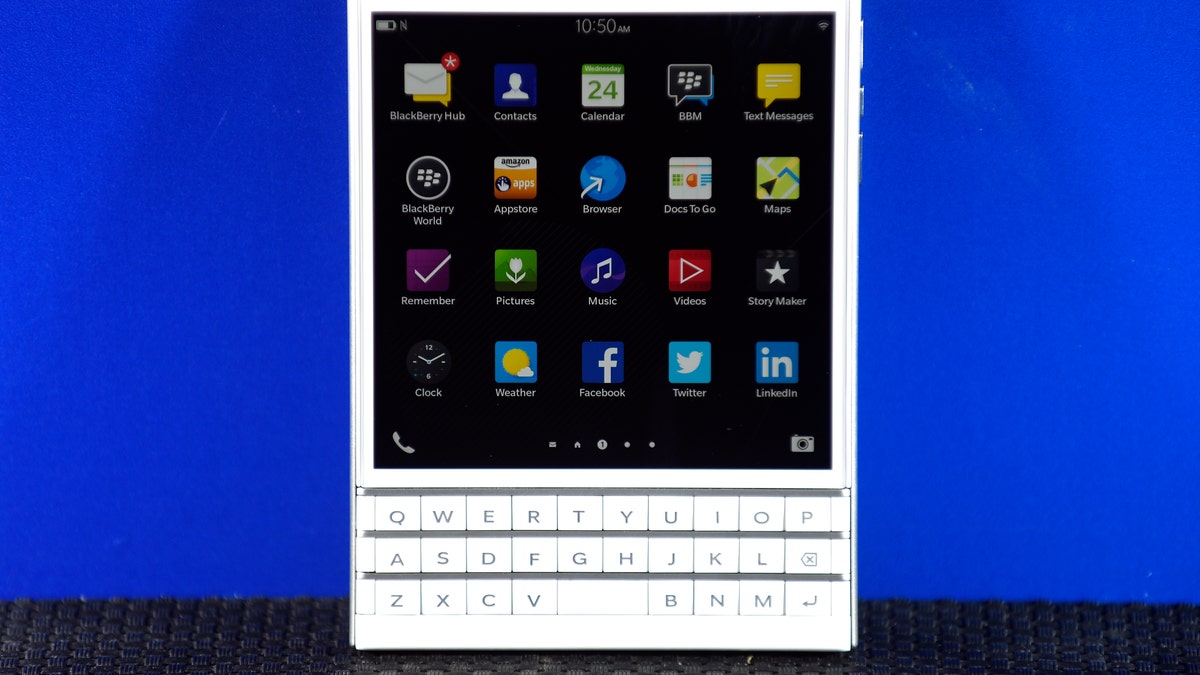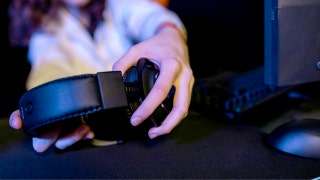
A BlackBerry Passport smartphone is shown at its official launching event in Toronto, Sep. 24. (REUTERS/Aaron Harris)
It was a year that was all about that bass, ice bucket challenges and Ebola scares, but 2014 was also a very interesting year in tech. iPhone fans finally got the big screen they had been clamoring for, fitness trackers really took off and Chromebooks took classrooms (and households) by storm. But it was also a year of epic tech fails, from Apple's celebrity photo hack scandal and an ice-cold Amazon Fire phone to smartwatches that just didn't do enough to justify their existence.
Here are the biggest tech flops of the year.
Aereo
On paper Aereo seemed like a cord-cutter’s dream. By paying $8 to $12 per month to rent one of Aereo's antennas, customers could stream and record their favorite shows from major broadcasters and enjoy them on their phones, tablets or laptops. There was just one big problem: those broadcasters argued that Aereo was stealing their programs via its copyright-violating business model. The Supreme Court agreed, dealing the upstart a bomb the size of 1,000 "Selfies." Five months later, Aereo filed for bankruptcy and called it quits.
BlackBerry Passport
So desperate to stand out in a sea of phablets, BlackBerry went wide with the Passport -- too wide. The Passport sports a very heavy and awkward square design that's pretty much impossible to use with one hand. And while the keyboard is big and cushy, it's simply not worth the trade-off to carry a tank in your pocket. Add in buggy performance and a camera that takes its sweet time focusing and it’s easy to see why I called this device the New Coke of smartphones. The newer BlackBerry Classic, with its more traditional design, looks more satisfying for CrackBerry addicts.
MORE: Best Last-Minute Tech Gifts
Android Wear
Interest in smartwatches is picking up, but that doesn't mean you should pick up one that uses Google's needlessly complicated and limited OS. Running on watches made by Asus, LG, Samsung and Sony, Android Wear delivers Google Now-style cards to your wrist to keep you in the know. Too bad the interface requires incessant swiping. My favorite example: the music player app keeps the Play/Pause and Skip buttons on different screens. Plus, you can't recall notifications later or reorder them from your phone. Some Android Wear watches have built-in heart rate monitors, but none of them have worked well. The Apple Watch has nothing to fear.
Tablet Crash
How does a market that grew 7.2 percent in 2014 count as a fail? Because that's a huge drop from the 52.5 percent growth from 2012 to 2013 for tablets. In retrospect, the reasons for this plummet are obvious. Shoppers are snatching up phablets (big-screen phones), which do nearly everything a tablet can, and they're holding on to their existing tablets much longer. There's just not enough of a difference between the $399 iPad Air and $499 Air 2. Speaking of Apple, IDC says the company will ship nearly 13 percent fewer tablets this year. 2015 will be the year of the big-screen tablet, but that may not be enough to resurrect this flagging category.
MORE: Best Phablets Money Can Buy
Sony PlayStation TV
With PlayStation in the name, the PlayStation TV tells you that it's more about games than entertainment. But you can't launch a streaming box in 2014 without Netflix, Hulu, Amazon, YouTube or the other channels consumers care about. The game experience was poor, too, as the PS Vita graphics just look blurry and crappy on a big-screen TV. The PlayStation TV doesn’t even support 1080p resolution, which doesn't sound very future-proof. Even at a wallet-friendly $99, this gadget is an epic fail.
MORE: Top Streaming Players Right Now
Apple iCloud Celebrity 'Hack'
Jennifer Lawrence and Kate Upton were among the more than 100 celebrities whose iCloud accounts were raided by hackers in order to steal and distribute racy photos. By taking advantage of a security flaw in iCloud -- which allowed unlimited password guesses -- the attackers likely used a brute-force attack to gain access to the celebs' accounts. Although iCloud itself wasn't hacked, people still associated Apple with porous security, which is not a good thing when you're rolling out a mobile-payment service. In September, CEO Tim Cook promised that Apple would alert users via email and push notifications when someone tried to change an account password or restore iCloud data to a new device.
Microsoft Kinect 2.0
As it turns out, gamers are more interested in playing games than talking to their consoles. Kinect 2.0 was supposed to be the one feature that allowed the Xbox One to lay the smack down on the PS4 in the battle for living room domination. Yet despite such gee-whiz features as voice recognition for snapping live TV next to your Sunset Overdrive session, Microsoft unbundled the new Kinect in May to make its console more price-competitive. The good news: the $349 Xbox One sans Kinect outsold the PS4 in November.
MORE: Xbox One vs PS4 - The Winner Is...
Google Glass
2014 was supposed to be the year that Google Glass went mass market, but last time I checked I didn't see anyone wearing one anywhere. Google has apparently delayed the launch of Glass to consumers and has shifted gears in the meantime to focus on businesses with its Glass at Work program. The move makes sense. You're less likely to be called a Glasshole if you’re using it to call up schematics of a building than wearing the geeky specs to the mall. It's possible that Glass could see a resurgence in 2015, but given that key employees and several developers have abandoned ship, it will be hard to keep Sergey Brin's dream alive.
MORE: Best Smartwatches on the Market
Softcard (formerly ISIS)
Saddled with one of the most unfortunate brand names ever, ISIS made the wise decision in September to change its name to Softcard to avoid any association with the violent Islamic militant group. Too bad there aren't any other reasons to talk about this mobile payment service now. Unlike the iPhone and Apple Pay, you need a special SIM card from your carrier (AT&T, T-Mobile or Verizon) to use your Android or Windows phone to pay at more than 200,000 locations nationwide.
Softcard is also harder to use than Apple Pay; instead of just holding up your phone to a terminal and pressing your finger to the Touch ID sensor, you need to open the Softcard app and enter your pin, select your payment method and then hold the back of your phone to the checkout terminal. No, thanks! At least Softcard has rolled out a new mascot called Tappy to educate shoppers on how to use the service. Anyone remember Clippy?
Amazon Fire Phone
Amazon has worked its magic in a lot of tech categories, but the Amazon Fire phone has been a disaster. Yes, Firefly wows, a feature that identifies more than 70 million products, as well as movies, music and TV shows. However, the Fire Phone weighs a full ounce more than the iPhone 6 and has a gimmicky 3D-like screen with low 720p resolution. The below-average battery life doesn't help, either.
Shoppers shunned this chunky AT&T exclusive, causing the carrier to drop the price from $199 to 99 cents on a two-year contract. Amazon took a $170 million write-down in the third quarter due to slow Fire sales, but Bezos & Co. will likely try again with a Fire Phone 2.








































